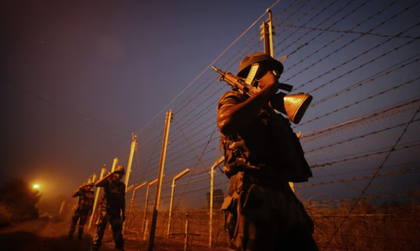Pakistan attacked with multiple missiles and drones, all effectively repulsed: Indian Army
By IANS | Updated: May 9, 2025 08:12 IST2025-05-09T08:07:48+5:302025-05-09T08:12:33+5:30
New Delhi, May 9 Pakistan Armed Forces launched multiple attacks using drones and other munitions along the entire ...

Pakistan attacked with multiple missiles and drones, all effectively repulsed: Indian Army
New Delhi, May 9 Pakistan Armed Forces launched multiple attacks using drones and other munitions along the entire Western border on the intervening night of May 8 and May 9, Indian Army officials said.
Pakistani troops also resorted to numerous cease fire violations (CFVs) along the Line of Control in Jammu and Kashmir.
The drone attacks were effectively repulsed and befitting reply was given to the CFVs, the Indian Army said in a statement.
Indian Army remains committed to safeguarding the sovereignty and territorial integrity of the Nation.
All nefarious designs will be responded with force, the Indian Army added.
India on Thursday night neutralised Pakistan military's attempt to hit military stations in Jammu, Pathankot, Udhampur and some other locations.
New Delhi's retaliation not only destroyed drones and missiles, but also shot down Islamabad's Airborne Warning and Control System (AWACS) aircraft, marking a significant blow to Pakistan's air surveillance and battlefield coordination capabilities.
Amid the escalating tensions between India and Pakistan, the Indian Armed Forces have successfully foiled a large-scale drone and missile attack launched by Pakistan to target multiple military stations in Northern and Western India, including Jammu, Pathankot and Udhampur, the Headquarters Integrated Defence Staff (HQ IDS) said.
In a post on X, the HQ IDS said: "Military Stations of Jammu, Pathankot and Udhampur in proximity to the International Boundary, in Jammu & Kashmir, targeted by Pakistan using missiles and drones. No losses. Threat neutralised by #IndianArmedForces as per standard operating procedure with kinetic and non-kinetic means."
The renewed attempts and intense shelling by the Pakistani forces on the Line of Control and the International Border in Jammu and Kashmir, Punjab and Rajasthan came after India on Thursday morning targeted Pakistani air defence systems at multiple cities with one in Lahore being "neutralised".
The Indian military responded swiftly and decisively, neutralising the threat using both kinetic and non-kinetic means in accordance with standard operating procedures (SoP).
As the Ministry of Defence reiterated that any attack on military sites in India will invite a "suitable response", Foreign Secretary Vikram Misri said Pakistan only can decide if it wants to de-escalate tensions with India as New Delhi responded to the "original escalation" triggered by the Pahalgam massacre.
Blackouts from several cities and towns in Jammu and Kashmir, Punjab and Rajasthan were enforced as drones were sighted from across the border.
Colonel Sofiya Qureshi, speaking at a Ministry of External Affairs press briefing, confirmed that India's Integrated Counter-UAS Grid and Air Defence systems had successfully countered the attacks.
"This morning, the Indian Armed Forces targeted Air Defence Radars and systems at a number of locations in Pakistan. The Indian response has been in the same domain and with the same intensity as Pakistan's. It has been reliably learnt that an Air Defence system in Lahore has been neutralised," Colonel Qureshi said.
She also detailed that during the night of May 7 to May 8, Pakistan attempted to strike military targets at several locations, including Awantipura, Srinagar, Jammu, Pathankot, Amritsar, Kapurthala, Jalandhar, Ludhiana, Adampur, Bathinda, Chandigarh, Nal, Phalodi, Uttarlai, and Bhuj.
However, India's robust air defence systems neutralised all attempted incursions, and debris from intercepted drones and missiles is being recovered from multiple sites, confirming the attacks.
The missiles were aimed at key locations, including Satwari (Jammu Airport), Samba, R.S. Pura, and Arnia, defence sources said.
A sudden power outage plunged Jammu city into darkness following two loud explosions, likely resulting from the interception of intruding drones. Immediately after, sirens echoed throughout the city, alerting panic stricken residents to seek shelter.
Sound of massive explosions were heard in Jaisalmer and a blackout was enforced in western Rajasthan districts bordering Pakistan, plunging the whole stretch into darkness, police said.
The escalation followed India's launch of Operation Sindoor -- a series of focused and precise strikes on nine terror camps located in Pakistan and Pakistan-Occupied Kashmir (PoK) — in response to the April 22 terror attack in Pahalgam that killed 26 people.
"Our actions have been focused, measured, and non-escalatory in nature. No Pakistani military facilities have been targeted. India has demonstrated considerable restraint in the selection of targets and the method of execution," the Ministry of Defence said on Wednesday.
At Thursday's media briefing, Colonel Qureshi reiterated that on May 7, India had clearly said that any attack on Indian military assets would invite a "suitable response".
Following Operation Sindoor, the Union government convened an all-party meeting on Thursday at the Parliament Annexe to brief political leaders on the security situation and India's calibrated military action.
Union Defence Minister Rajnath Singh led the briefing, which was attended by Union Home Minister Amit Shah, BJP President J.P. Nadda, Congress President Mallikarjun Kharge, and Leader of the Opposition in Lok Sabha Rahul Gandhi, among others.
Foreign Secretary Vikram Misri, Colonel Sofiya Qureshi, and Wing Commander Vyomika Singh also addressed the press conference following the all-party meeting.
Disclaimer: This post has been auto-published from an agency feed without any modifications to the text and has not been reviewed by an editor
Open in app